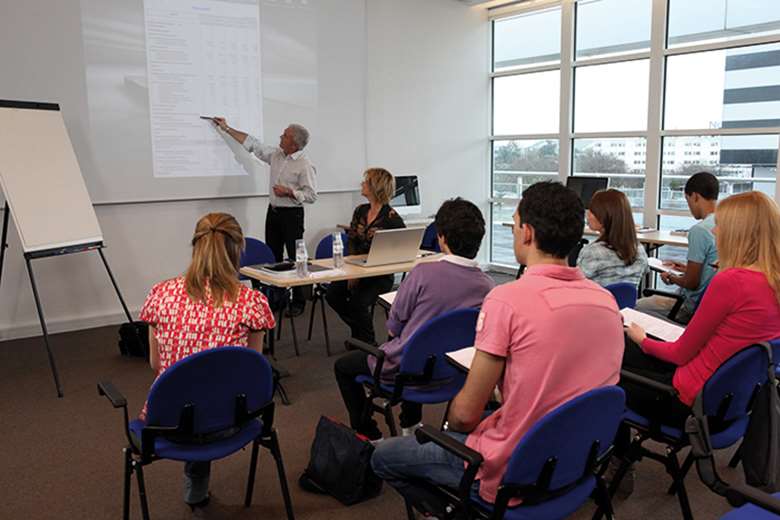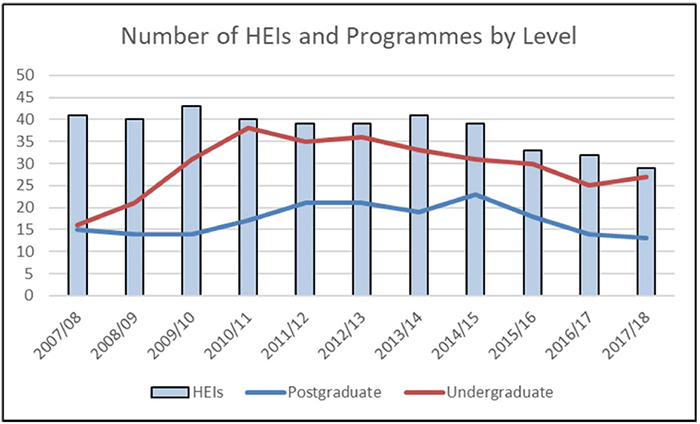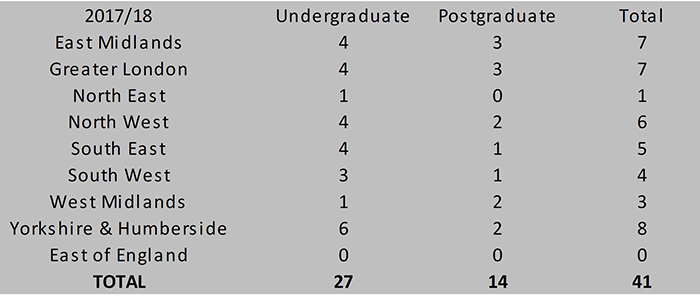Youth work training figures reveal record lows
Dan Parton
Wednesday, August 14, 2019
The number of youth work training programmes has fallen in an ongoing annual trend, according to new figures.

The proportion of higher educational institutions offering training programmes in the sector nationally declined in 2017/18 and there were just 41 programmes on offer in England, the National Youth Agency reports.
There were no courses on offer at all in the East of England, and just one undergraduate course in the North East, the NYA found.
The NYA suggests this this may be mitigated by an increasing number of settings offering distance learning courses.
While the same number was recorded as in 2016/17, the response rate was higher this year, suggesting a continued downward trend since a peak in courses in 2010/11.
- Analysis: Youth work reforms need universal focus
- Analysis: The policies that have dismantled youth work
There were just 432 students in 2017/18, less than half the 951 that attended in 2011/12.
It is not known if shortfalls in academic training are being offset via more vocational-based learning, or if more students are enrolling on non-Joint Negotiating Committee (JNC) and multi-disciplinary courses.

Respondents to the survey reported that this decline is down to youth work being seen as an increasingly uncertain employment pathway due to a lack of secure jobs and cuts in youth services nationally with employers having limited or no staff development budgets.

The report adds: "The period since then has seen the introduction of fees for study, especially important for mature student entry, and austerity measures impacting heavily on the youth sector.
"Both are likely explanations for the reduction of provision and student numbers."
The lowest proportion of teaching staff on record are JNC qualified. In 2017/18 there were 257 full-time teaching staff across all courses, of which 57 per cent were JNC qualified.
In addition, two courses had no full-time JNC-qualified tutor and indicated a number of part-time lecturers.
The report states that the NYA will contact them to explore whether requirements are being met.
Of the part-time teaching staff, 76 per cent were JNC qualified, which is consistent with previous years.
There has also been a drop in the opportunities for work placements, and the number of supervisors used in them.
The NYA reports that many institutions have voiced concern at this, attributing it mainly to a reduction in the number of statutory-funded youth services, affecting the number of available placements and geographical proximity.
That said, those placement providers still active remain strong, according to respondents to the research.
Cat Smith MP, Labour's shadow minister for youth affairs, described the figures as a "devastating reflection of the state of youth services in this country after nine years of austerity".
Smith added: "Youth workers play a vital role in our communities by building young people's aspirations and spotting the emergence of anti-social behaviour and divisive ideologies before they become social problems.
"By cutting youth workers, the Tories have denied young people the opportunity to speak to someone outside of school and their home environment to get the support they need.
"The next Labour government will implement a workforce strategy to regrow the workforce and introduce new legislation guaranteeing quality youth services for all of our young people."
However, there are reasons for optimism, according to the NYA, which cites a government commitment to developing a new Youth Charter, along with hopes for fresh investment.
The government has also pledged to renew youth work qualifications that were due to expire in 2020, and a review of the youth work curriculum.
In addition, subsidised training places at Levels 2 and 3 for youth workers have been announced.
The NYA said in a statement that it "looks forward to securing future investments to instil a broader renewal of youth work".




